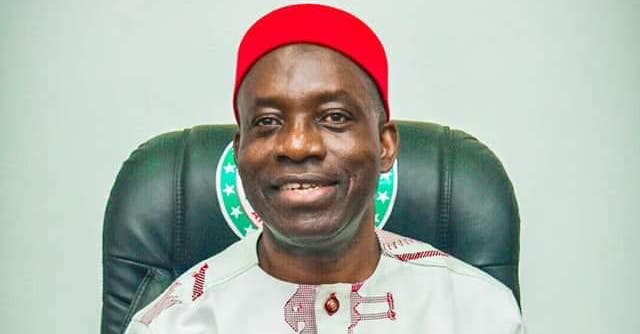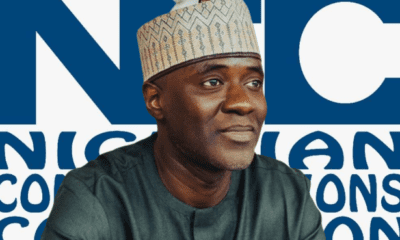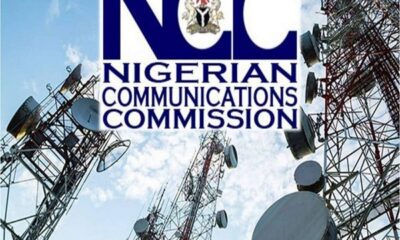News
NCC assures Nigerians 70% broadband penetration by end of 2023
The Nigerian Communication Commission (NCC) has assured Nigerians to meet it’s target of 70% broadband penetration at the end of the year. This was stated by the Executive Vice Chairman/CEO, NCC, Dr Amimu Maida’s speech at the Lagos International Trade Fair yesterday.
The Vice Chairman examined the theme of the 2023 trade fair: ‘Connecting Businesses, Creating Value’, stating that it is very apt and timely, especially considering that it aligns suitably with the strategic direction of the Ministry of Communications, Innovations and Digital Economy.
He explained, ‘Our Honorable Minister has put forward a Strategic Agenda for the period of 2023 to 2027 with a vision to reimagine the Ministry of Communications, Innovation and Digital Economy as the public sector ecosystem that enables Nigeria’s economic growth through enhanced productivity, facilitated by technological innovation.’
He explained that at the heart of this Strategic Agenda are five pillars which include Policy, Infrastructure, Innovation, Entrepreneurship and Capital, Trade and Knowledge. ‘All of these pillars are interconnected with each other and form the bedrock of the delivery of the Honorable Minister’s vision’, he said.
‘We have seen the transformative power of digital connections during recent challenges, where businesses relied on telecommunications to adapt and survive. Hence, the Commission believes that in our connected world, connectivity is not a luxury but it is a necessity, It is our duty at the Commission to ensure that everyone’s business, from the small startups to the digital highway, regardless of the locatiions, has equal access keying into the vision of the Honorable Minister of Commerce. It is in this light and in Digital Economy that the NCC is Pursuing the target of boosting broadbands penetration rate to 70%’ at the end of the year’ he said.
Dr Amimu enumerated that the telecommunications sector has been a strategic driver of the digital economy agenda of the Federal Government. He stated that they bear the responsibility of ensuring the sustainability and vitality of the sector by leveraging telecommunications infrastructure to empower individuals, connects businesses, strengthen industries and enable Governments to provide essential services efficiently, thereby driving development and prosperity.
According to him, Providing an enabling environment for the deployment of critical digital infrastructure is tied to the Infrastructure Pillar of the Honorable Minister’s vision for the Digital Economy. He stated, ‘We believe that by so doing, we would guarantee improved access to quality broadband connectivity and increased economic activity in the digital space.
‘Creating value in the telecommunications sector is not just about providing faster and more reliable connections; it’s about fostering an environment of fair competition, innovation, and inclusivity. This means that we must encourage investment in infrastructure, stimulate research and development, and protect consumers’ interests. By doing so, we can unlock the full potential of our businesses, boost productivity, and ultimately create a more prosperous society.’
As regards the commission’s Our regulatory approach, Dr Amimu explained that it is designed to address the ever evolving landscape of technology. As 5G, IoT, and other innovations become integral to business operations, he emphasized their proactiveness in adapting policies to support the integration and protect the interests of all stakeholders.
Dr Amimu further expressed, ‘The Honorable Minister of Communication, Innovation and Digital Economy, Dr. Bosun Tijani has identified nine priority policy, regulatory and strategic initiatives for review and implementation to create an effective policy environment where businesses and innovators are empowered to grow.
‘These nine priority policy, regulatory and strategic initiatives include: the Nigerian National Broadband Plan, the National Policy on Digital Public Infrastructure, the National Policy on Telecommunications, the National Blockchain Policy, the National Digital Economy Bull, the Nigeria Startup Act, the National Artificial Intelligence Strategy, the National Data Strategy and the National Digital Literacy Framework.
‘The Commission is working assiduously with various stakeholders and the consumers, to see how more businesses can embrace digital platforms for deivering their services to the consumer. As to regulators, we also ensure we constantly inform you, the consumers on how to be protected to prevent cases of fraud or avoid consumer falling victims of cybercrime antics while in their legitimate use of the Internet.’ be assured.
In his keynote speech, the President Lagos Chamber for Commerce and Industry LCCI Asiwaju Dr The President LCCI reiterated the THEME FOR THE ANNUAL FAIR: ‘CONNECTING BUSINESSES, CREATING VALUE’. He expressed that theTHEME UNDERSCORES THE IMPORTANCE OF RELATIONSHIPS AND NETWORKING AMONG BUSINESSES FOR WEALTH CREATION, TRADE PARTNERSHIPS, AND PRODUCTIVITY GROWTH. He said, ‘THE THEME ALSO UNDERSCORES THE VALUE OF INTERACTIONS BETWEEN PRODUCERS, SERVICE PROVIDERS AND END-USERS.
The President highlighted the enormous impact of the commission in regulating the telecommunications industry. He also appraised their innovative and collaborative efforts in ensuring a digital economy for Nigeria.
News
NSCDC arrests 11 pipeline vandals in Benue


The Anti-Vandal Unit of the Nigerian Security and Civil Defence Corps has arrested 11 suspected pipeline vandals opposite the depot of the Nigerian National Petroleum Corporation Limited at Apir, a suburb of Makurdi, Benue State capital.
The State Commandant of the corps, Yakubu Ibrahim, who disclosed this on Saturday said that following an intelligence report, the command dispatched its team to the area opposite the NNPCL depot at Apir.
Ibrahim said that the team discovered an illegal vandalisation of an NNPCL pipeline also known as the Yola line at the location.
Ibrahim said, “Eleven persons were apprehended at the crime site and they will be taken for questioning and profiling.”
While describing the activities of the vandals as an “act of terrorism,” the commandant said the destruction which stretches over 10km was an economic sabotage.
“This is my first time. I’ve never seen a thing like this before. It’s disheartening that these excavated pipelines which may have cost so much would be sold for pittance, indicative that the well-being of the Nigerian people was never in their consideration,” the commandant said.
Ibrahim expressed sadness over what he described as a “conspiracy of silence” by the residents and traditional rulers of the community near the scene of the incident. He, however, promised to investigate if they were found complicit.
He urged the people of the state to be more vigilant and more conscious of activities in their environment.
Items recovered at the site were the vandals’ working equipment with 16 cut pipelines.
In late April 2024, men of the Benue State Community Volunteer Guards arrested two pipeline vandals in Yakyor in Apir, a suburb of Makurdi.
The culprits were trailed and arrested at the weekend after they had sold the first batch of the loot for N400,000 and shared the money, according to Joseph Har, the Special Adviser to Governor Hyacinth Alia on Security and Internal Affairs.
News
SERAP sues 36 governors, FCT minister over FAAC allocations


The Socio-Economic Rights and Accountability Project has sued Nigeria’s 36 governors and the Minister of the Federal Capital Territory, Abuja,Nyesom Wike.
They were sued for failing “to account for the spending of trillions of Federation Account Allocation Committee allocations collected by their states and the FCT since 1999″.
This was contained in a release on Sunday by SERAP’s Deputy Director, Kolawole Oluwadare.
The release said the lawsuit followed reports that the FAAC disbursed N1.123 trillion to federal, state, and local governments for March 2024. They shared N1.208 trillion in April. States collected N398.689 billion in March while they collected N403.403 billion in April.
In the suit numbered FHC/ABJ/CS/666/2024 filed last Friday at the Federal High Court, Abuja, SERAP asked the court to “direct and compel the governors and Wike to publish spending details of the FAAC allocations collected by their states and the FCT since 1999 including the list and locations of projects executed with the money.”
The organisation also asked the court to “compel the governors and Mr Wike to invite the Economic and Financial Crimes Commission and the Independent Corrupt Practices and Other Related Offences Commission to probe any allegations of corruption linked to the allocations and to monitor how the money is spent”.
It argued that, “Nigerians ought to know in what manner public funds including FAAC allocations, are spent by the governors and FCT minister.”
“Opacity in the spending of the FAAC allocations collected by the governors and Mr Wike would continue to have negative impacts on the fundamental interests of the citizens,” SERAP said.
It noted that trillions of FAAC allocations received by Nigeria’s 36 states and the FCT have allegedly gone down the drain.
It believes that, “Directing and compelling the governors and FCT minister to provide the information sought and widely publish the spending details of the FAAC allocations collected by them would serve legitimate public interests.”
It added, “The failure by the governors and the FCT ministers to account for the spending of the FAAC allocations collected by them is entirely inconsistent and incompatible with the Nigerian Constitution 1999 [as amended] and the country’s international anti-corruption obligations.”
The suit filed on behalf of SERAP by its lawyers Kolawole Oluwadare, Kehinde Oyewumi and Andrew Nwankwo, read in part, “States and the FCT should be guided by transparency and accountability principles and proactively account for the spending of the FAAC allocations collected by them.
“Secrecy in the spending of FAAC allocations collected by the governors and the FCT minister also denies Nigerians the right to know how public funds are spent. Transparency in the spending would allow them to retain control over their government.
“The governors and FCT minister have a legal obligation to provide the information sought including the list of specific projects completed with the FAAC allocations collected, the locations of any such projects and completion reports of the projects.
“The information sought should also include details of the salaries and pensions paid from the FAAC allocations collected, as well as the details of projects executed on hospitals and schools with the FAAC allocations.
“Despite the increased FAAC allocations to states and FCT, millions of residents in several states and the FCT continue to face extreme poverty and lack access to basic public goods and services”
It added, “The reported removal of petrol subsidy and the floating of the exchange rate by the Federal Government has translated into increased FAAC allocations to states and the FCT. However, there is no corresponding improvement in the security and welfare of millions of Nigerians.
“FAAC allocations received by the states and the FCT are reportedly characterised by mismanagement, diversion of funds, and abandoned projects. FAAC allocations have also been allegedly spent for other purposes such as election campaigns and political patronage.
“Publishing the documents on the spending of FAAC allocations by the states and the FCT would promote transparency, accountability, and reduce the risks of corruption in the spending of the funds.
“Publishing the documents would also enable Nigerians to meaningfully engage in the implementation of projects executed with the FAAC allocations collected.”
SERAP noted that the report that “some 140 million Nigerians are poor suggests corruption and mismanagement in the spending of trillions of naira in FAAC allocations collected by the states and the FCT”.
News
Soludo sacks 21 Anambra transition committee chairmen 19th May 2024


Anambra State Governor, Chukwuma Soludo, has sacked all transition committee chairmen across the 21 local government areas of the state.
This is contained in a letter titled ‘Expiration of tenure and handover to Heads of Local Government Administrations (HLGAs),’ dated May 17, 2024, and signed by the state Commissioner for Local Government, Chieftaincy and Community Affairs, Collins Nwabunwanne.
The order takes effect from Monday, May 20, 2024.
The letter read, “Following the expiration of your tenure as Transition Committee Chairman, you are hereby directed to handover the affairs of your Local Government Council to the Head of Local Government Administration (HLGA), in your respective Local Government Councils.
“This directive takes effect from Monday, 20th day of May, 2024. Thank you for your service to the state.
“All replies to be addressed to the Honourable Commissioner.”
The last time LG elections were held in Anambra State was towards the end of former Governor Peter Obi-led administration in 2014.
Since then, the local governments have been run by caretaker committee chairmen.
It was 10 years in January 2024 since the elections were last held, after the administrations of another former governor, Willie Obiano, and incumbent, Soludo.
During a forum organised by the International Peace and Civic Responsibility Centre in collaboration with the African Centre for Leadership and Development in December 2023, stakeholders including monarchs, clerics and residents, urged Soludo to conduct elections in the 21 LGs in the state, adding that governance is suffering at the grassroots due to the non-elected officials.
Meanwhile, Soludo had, during the 2021 governorship campaign and even at his swearing-in as the state governor on March 17, 2022, assured all that he would conduct LG elections within six months in office.
-
Finance4 months ago
Court orders Sen. Victor Umeh to repay N136m bank debt to AMCON
-



 Abuja Update3 months ago
Abuja Update3 months agoUNDP, FG partnership needed to achieve inclusion, equity- Minister
-
Abuja Update2 months ago
Banks drive stock market performance with N147bn gain
-
capital market2 years ago
Rt.briscoe, FBNH, Others halts negative performance of stock market
-
Submission Guidelines4 months ago
CALL FOR SUBMISSIONS: POETRY COLUMN-NND
-



 Health1 month ago
Health1 month agoCapacity training will reduce migration of health workers- NPHCDA
-



 Business4 weeks ago
Business4 weeks agoTingo Group unveils Tingo Electric, Tingo Cola drink at Lagos launch
-
News5 months ago
Oil thieves sponsoring malicious media campaign against Navy – Spokesman














